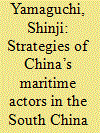| Srl | Item |
| 1 |
ID:
128974


|
|
|
|
|
| Publication |
2013.
|
| Summary/Abstract |
The basic question this paper asks is how the domestic instability in China will affect external action.
China's society is undergoing a major change along with its economic growth, with various social
contradictions deepening, including gaps between the rich and the poor. These social contradictions
occasionally erupted in riots and demonstrations. Scholars have argued what sorts of external action
these developments would lead to, on which there are two camps of thought: (i) expansion, and (ii)
compromises. The problem is that for what reasons and through what mechanisms the domestic
instability would lead to external actions have not yet been fully clarified. Domestic instability does
not necessarily always influence external actions in all countries. There should be some conditions
in order for domestic instability to influence external actions. This paper argues that the intervening
variable that links domestic issues to external policy is the stability of the political system. From this
perspective, the current instability of China's political system is only limited and the likelihood that
domestic problems should be diverted to its external policy is not so high at the present stage. For
the moment at least, China is not in a situation where domestic instability would lead to hard-line
external policy, as suggested by diversionary theory. That is because the extent to which domestic
problems in China can make the political system itself unstable is limited. Meanwhile, regarding
the claim that China cannot compromise on external policy under the watchful eyes of the domestic
elite or society as a whole, as suggested by audience cost theory, there is both supporting and
negating evidence at present.
|
|
|
|
|
|
|
|
|
|
|
|
|
|
|
|
| 2 |
ID:
147841


|
|
|
|
|
| Summary/Abstract |
This paper aims to explore the coordination among China’s various maritime actors in the South China Sea (SCS). Since around 2009, China has reinforced its maritime territorial claims in the SCS and has taken coercive measures, including harassing other countries’ vessels and using administrative tools to expand its effective control over disputed islands. One important question is whether China’s tactics are based on a well-coordinated plan or are the unintended consequence of competition and self-interest among the various agencies. This paper shows that, firstly, organisational coordination between these agencies is improving, secondly, that the PLA has a salient role in the operation, and lastly, that the long term trend is important. The paper implies that long-term aspirations are coalescing into more concrete plans under the strong leadership of Xi Jinping.
|
|
|
|
|
|
|
|
|
|
|
|
|
|
|
|